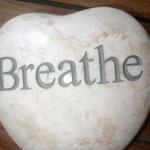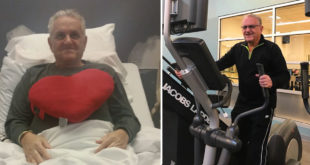By Michelle Sutton-Kerchner
Just when you’ve escaped the grip of cold and flu, you stumble into hay-fever season. Although you can’t exercise away your allergies, a regular workout helps manage symptoms …
Allergies can make you miserable. Beyond primary symptoms that cause an itchy, sneezey, juicy face, they also can make you overall fatigued. Good news! Studies have proven regular exercise can help contain allergies. Physical activity results in a strong blood flow. This allows allergens to be moved quickly through the body and eliminated via the kidneys and skin.
A lack of exercise results in a sluggish blood flow. Stagnant allergens gather in a fixed position, which begins to destroy the tissues around them. Constant movement of the allergens through the blood stream prevents these delicate tissues from becoming inflamed.
Recommended Exercises
Exercise doesn’t have to be intense or challenging. Simple movements get blood pumping and rid you of pesky allergens. You shouldn’t overexert yourself, especially during your peak allergy season. The American College of Allergy, Asthma & Immunology emphasizes overdoing physical activity could exacerbate symptoms rather than help.
 Often, people are allergic to dust mites, pet dander, seasonal triggers, and insect bites. As a Center member, the limitations caused by these allergies are eliminated. A clean, filtered environment allows an allergy-free workout every time. The Center’s regulated temperature also reduces the likelihood of extreme allergic reactions common to hot weather workouts, such as exercise-induced anaphylaxis.
Often, people are allergic to dust mites, pet dander, seasonal triggers, and insect bites. As a Center member, the limitations caused by these allergies are eliminated. A clean, filtered environment allows an allergy-free workout every time. The Center’s regulated temperature also reduces the likelihood of extreme allergic reactions common to hot weather workouts, such as exercise-induced anaphylaxis.
Consider using a decongestant, antihistamine, saline spray, or neti pot prior to your workout. For those with asthma, a puff on your inhaler might be necessary. This will aid in clear nose-breathing during exercise. Nose-breathing warms and filters air intake, and prevents a dry, sore throat. It also acts as a purifier to remove allergens, irritants, and pollutants from entering your lungs and bronchial passageways.
Aquatic exercise, through both classes and training, provides an ideal workout environment for allergy sufferers. The humid, warm air helps clear sinuses and is gentle on lungs. Those with allergies and asthma accomplish an exhilarating exercise program without triggering symptoms. Unless you have a specific allergy to chlorine, taking a dip might clear the air.

Don’t forget to warm-up. The American Academy of Allergy, Asthma & Immunology indicates warm-ups help reduce allergic symptoms. Spend approximately ten minutes stretching and boosting cardio for full benefit.
Focus on exercises that promote proper breathing. Yoga and Pilates, which concentrate on deep breathing, are helpful. Perform workouts that strengthen your heart and lungs. Resistance training and stop-and-go forms of exercise are preferred, especially if you suffer from asthma. Long-duration runs and cycling may trigger symptoms, especially if excessive cardio initiates shortness of breath.
For tips on exercises shown to help relieve sinus pressure, see “Work Out Sinus Pressure” at https://fitnessandwellnessnews.com/health/work-out-sinus-pressure. For those who suffer specifically from asthma, check out “Breath Easy…” at https://fitnessandwellnessnews.com/health/breathe-easy-you-can-exercise-with-asthma-allergies. Discover how exercise strengthens and conditions the lungs to help keep you breathing freely.
After a workout, hit the Center’s steam room or indulge in a steamy shower followed by cooler water. This temperature shift further loosens mucus in the sinuses and bronchial tract for the ultimate cleansing breath.
Fitness Outdoors

Your inner athlete may channel you to a neighbor’s volleyball game or provoke you to join a spring sporting event. Consider these tips when exercising outside:
- Take note of your surroundings. For someone allergic to weeds and grass pollens, playing tennis on a campus field surrounded by dandelions isn’t recommended. If you suffer from molds, don’t toss the Frisbee near a lake.
- Try wearing a mask to filter pollen and pollution for those outdoor walks. Sunglasses protect eyes from airborne allergens as well as ultraviolet rays.
- Check the daily pollen and mold counts for your area (easily found at www.weather.com). Schedule outdoor activities around the peak times.
- Determine what your allergy triggers are.

One person's love is another's allergy. Know your triggers. - Avoid outdoor excursions on hot, windy days, which literally blow countless allergens through the air.
- Beware of thunderstorms. Asthmatic reactions tend to peak after these for some sufferers, according to research based on hospital emergency room treatments.
- Avoid exercising around factory fumes and car exhaust. Pollution can trigger or exacerbate allergy symptoms.
Stay well hydrated while exercising, especially when taking allergy medication, which can cause dry mouth, or if you’re breathing through your mouth instead of your nose.
Allergies or Cold?
With a casual shrug, people often blame their sneezing and nose-blowing on allergies. Only later, when your entire family is coughing and congested, does it become apparent that you’ve all been duped.
According to the National Institute of Allergy and Infectious Diseases, here are easy differentiators: Allergies are not accompanied by a fever, aches, and overall body pain. In fact, a fever is rarely a symptom of the common cold. A cough and sore throat are occasionally found with allergies, but almost always appear with a cold.
Often, it’s hard to decide if you should forego a workout when you are sick. Find tips to help you determine in “Build up Your Defenses” at: www.fitnessandwellnessnews.com/health/build-up-your-defenses. With allergies, if symptoms are bad, postpone until an allergy remedy starts working.
Millions suffer from allergies every day of the year. Don’t sacrifice your workout. With the right fitness program, you can feel your best and maybe even minimize some sniffling. And that’s nothing to sneeze at.
Sources
“Allergies & Exercise,” at www.livestrong.com.
“Cold or Allergy? Which Is It?” by James M. Steckelberg at www.mayoclinic.com.
“Hot to Cure Your Allergies,” at www.drugresource.org.
“Swimming & Allergies,” at www.livestrong.com.
“Will Exercise Help My Nasal Allergy?” by Bobbie Hasselbring at www.health.howstuffworks.com.
“8 Odd Things that Can Trigger Asthma Attacks,” by Dennis Thompson Jr. at www.everydayhealth.com.
Image Credits
Stack of empty tissue boxes (introductory photo): www.flickr.com/photos/tuchodi/395744483
Breathe heart: www.flickr.com/photos/shawnzlea.
Stretch: www.flickr.com/photos/lululemonathletica/4884156072
Surroundings: www.flickr.com/photos/60083281@N07/5558109057/
 Fitness & Wellness News Your Source for Fitness News, Wellness News, Health News, and Nutrition News!
Fitness & Wellness News Your Source for Fitness News, Wellness News, Health News, and Nutrition News!




One comment
Pingback: Allergies and Running | Dang Yankee